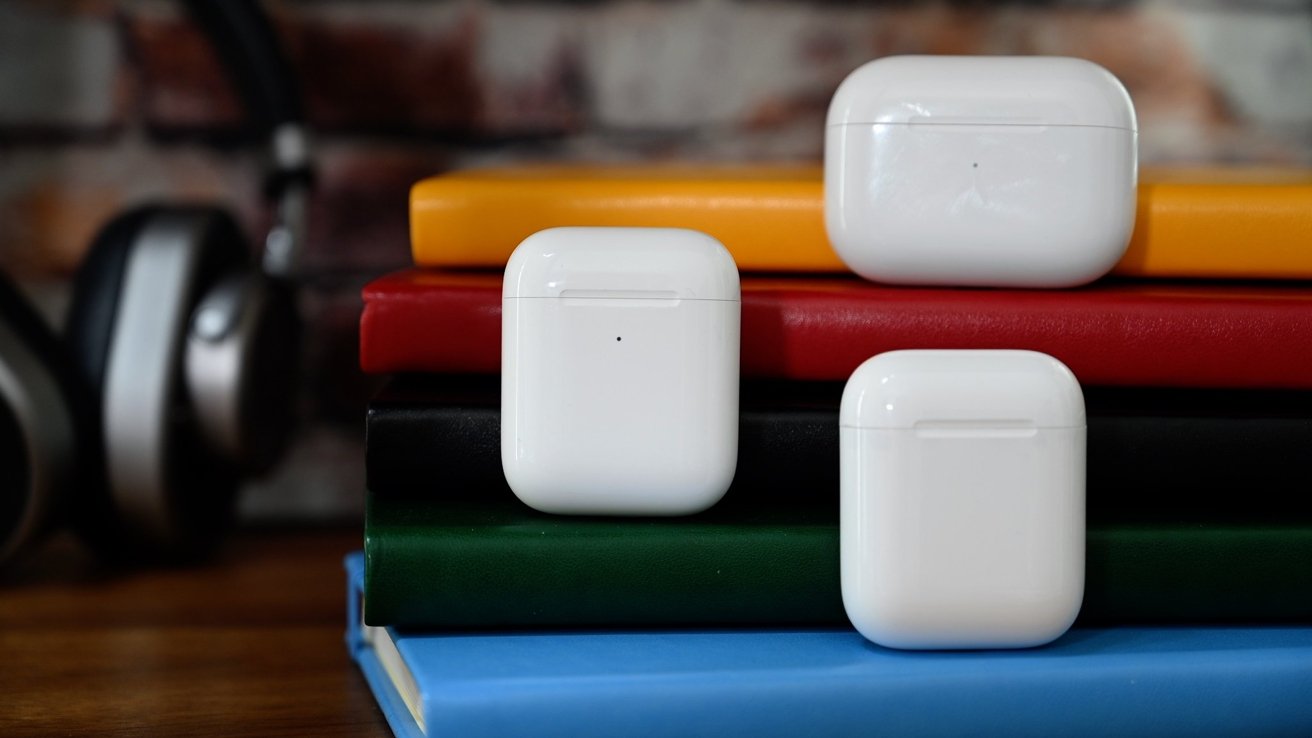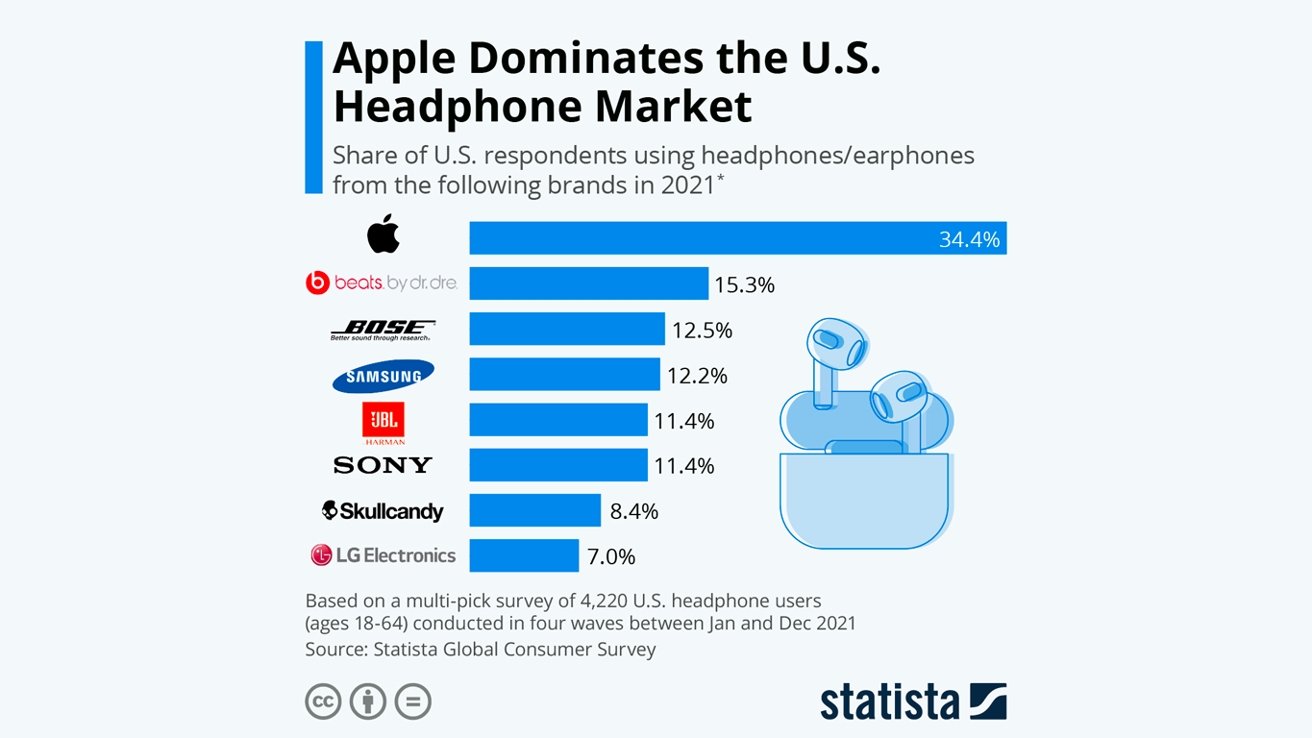Apple takes majority share of U.S. headphone market, study finds
According to a recent study, nearly 50% of polled U.S. consumers own either Apple's AirPods or a product from Apple's Beats lineup.

The study, run by Statista, asked 4,220 adults between the ages of 18 and 64 in the United States about the headphones they use. It found that 34.4% of the responders used Apple's AirPods. The survey didn't specify between products in the AirPods lineup.
Perhaps even more interesting was the fact that the second-highest share was Beats by Dre, which are also Apple headphones. Beats accounted for 15.3% of the market.

Image Credit: Statista
The remaining shares were Bose at 12.5%, Samsung at 12.2%, JBL and Sony each account for 11.4%, Skullcandy at 8.4%, and LG Electronics at 7.0%.
Launched in 2016, AirPods were Apple's first foray into wireless earbuds. Since then, Apple has expanded the lineup to include the higher-end AirPods Pro and the over-ear headphones AirPods Max.
In 2020, Apple's AirPods and Beats dominated the audio wearable market. Apple shipped an estimated 108.9 million AirPods and Beats devices throughout the year.
Read on AppleInsider

The study, run by Statista, asked 4,220 adults between the ages of 18 and 64 in the United States about the headphones they use. It found that 34.4% of the responders used Apple's AirPods. The survey didn't specify between products in the AirPods lineup.
Perhaps even more interesting was the fact that the second-highest share was Beats by Dre, which are also Apple headphones. Beats accounted for 15.3% of the market.

Image Credit: Statista
The remaining shares were Bose at 12.5%, Samsung at 12.2%, JBL and Sony each account for 11.4%, Skullcandy at 8.4%, and LG Electronics at 7.0%.
Launched in 2016, AirPods were Apple's first foray into wireless earbuds. Since then, Apple has expanded the lineup to include the higher-end AirPods Pro and the over-ear headphones AirPods Max.
In 2020, Apple's AirPods and Beats dominated the audio wearable market. Apple shipped an estimated 108.9 million AirPods and Beats devices throughout the year.
Read on AppleInsider

Comments
Once again Apple takes a product that is initially mocked as overpriced and flawed in various ways and a few years later is the ubiquitous market leader.
That's the largest share, and is very impressive and good news if you're a fan of Apple. But what it isn't is a majority.
1. Sells more phones alone than Apple sells phones, tablets and Macs combined.
2. Also sells a good number of tablets and a decent number of watches and headphones, and some PCs.
And those are merely the products where Apple and Samsung directly compete. Where they do not:
3. Samsung is the #1 seller of smart TVs by a good margin.
4. Samsung sells a ton of traditional home audio/theater products too (projectors, sound bars, speaker systems etc.)
5. Even some of their monitors have built-in speakers.
So yeah, Samsung sells more speakers than Apple does by a mile. In fact they would still rival Apple were you to take their Android products away.
Sorry guys, but myopic views of the tech industry - such as the strange idea that Microsoft is sitting around crying over not having a mobile OS when their current CEO is a cloud guy who opposed Microsoft's mobile efforts in the first place (that was Ballmer's folly) - or how losing Apple's 5% to 8% market share is going to devastate Intel (when Intel will sell 5 times as many GPUs to PC makers and consumers as they ever sold CPUs to Apple) aren't helpful. A big, huge world out there of people who don't use Apple products.
You have to remember that Apple is MUCH BIGGER in North America than anywhere else. Apple has 25% PC market share in North America but Macs are almost never seen in the wild in much of the rest of the world. The iPhone has 50% market share in America, the iPad probably bigger, but outside of Japan the rest of the world is Android dominance. (And Japan does so for nationalism reasons, as Android devices are produced primarily by South Korea and China. To show the impact of this nationalism, Japan is one of the few areas outside North America where Chromebooks have gotten traction ... primarily because Japanese companies make them). This shows just how absurd statements like "there's no doubt that Apple physically sells more speakers than any other company in the world" are. Indeed Xiaomi - whose smartphone sales rival Apple and also sells no small amount of TVs and other audio capable devices in categories that Apple is not in - may exceed Apple here.
Not sure that the alternative is. Wi-Fi speakers are good for home audio but not practical for anything else. (Plus an office full of people using Wi-Fi for their PCs, smartphones AND headphones would stink.) NFC speakers are great - there was an attempt to make them a thing shortly after NFC support was added to Android in 2012 - but the range is too short and they can't be used with anything else (PCs, TVs, smartwatches, consoles etc.) The same would be true of UWB even if the range was better.
A consortium of the leading manufacturers and platform owners - Apple, Microsoft, Google, Samsung, Sony, LG, Alcatel, Xiaomi, BBK, Lenovo, Dell, HP etc. - would need to come together, agree on a "let's get rid of Bluetooth" standard and agree to implement that standard in all their products. Even then, those products would need to support Bluetooth to be backwards-compatible with the like 10 billion devices where it is the only option. AND the new products going forward would need the new option to be SIMPLER and easier to find/configure in the settings than Bluetooth because otherwise that is what everyone is going to use. That was a problem with the NFC speakers that I bought ... pairing them to my Samsung over NFC was harder than pairing them over Bluetooth, so I eventually just used Bluetooth. Getting everyone to go from 3G to 4G - then from 4G to 5G - would be simple by comparison.